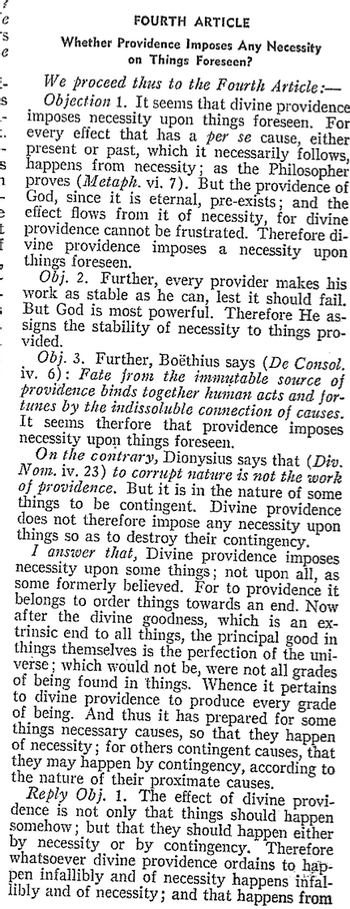
Social Psychology (10th Edition)
10th Edition
ISBN: 9780134641287
Author: Elliot Aronson, Timothy D. Wilson, Robin M. Akert, Samuel R. Sommers
Publisher: Pearson College Div
expand_more
expand_more
format_list_bulleted
Question
Read ST I.22.4. Does providence impose necessity on things foreseen? Besides God,
what is the principle good in things? What does this mean for the providential ordering of
all things by God? Put differently, what does providence seek to accomplish in human
beings?

Transcribed Image Text:125
PREDESTINATION
contingency, which the plan of divine provi-
dence conceives to happen from contingency.
Reply Obj. 3. The order of divine provi-
dence is unchangeable and certain, so far as
all things foreseen happen as they have been
foreseen, whether from necessity or from con-
tingency.
Reply Obj. 3. That indissolubility and un-
changeableness of which Boëthius speaks, per-
tain to the certainty of providence, which fails
Pt. Q.23 Art. 1
not to produce its effect, and that in the way
foreseen; but they do not pertain to the neces
sity of the effects. We must remember that
properly speaking necessary and contingent
are consequent upon being, as such. Hence
the mode both of necessity and of contingency
falls under the foresight of God, who provides
universally for all being; not under the fore-
sight of causes that provide only for some par-
ticular order of things.

Transcribed Image Text:e
S
Fe
-
S
|-
FOURTH ARTICLE
Whether Providence Imposes Any Necessity
on Things Foreseen?
We proceed thus to the Fourth Article:-
Objection 1. It seems that divine providence
imposes necessity upon things foreseen. For
every effect that has a per se cause, either
present or past, which it necessarily follows,
Es happens from necessity; as the Philosopher
proves (Metaph. vi. 7). But the providence of
God, since it is eternal, pre-exists; and the
effect flows from it of necessity, for divine
t providence cannot be frustrated. Therefore di-
f vine providence imposes a necessity upon
things foreseen.
1
Obj. 2. Further, every provider makes his
work as stable as he can, lest it should fail.
But God is most powerful. Therefore He as-
= signs the stability of necessity to things pro-
vided.
Obj. 3. Further, Boëthius says (De Consol.
iv. 6) Fate from the immutable source of
providence binds together human acts and for-
tunes by the indissoluble connection of causes.
It seems therfore that providence imposes
necessity upon things foreseen.
On the contrary, Dionysius says that (Div.
Nom. iv. 23) to corrupt nature is not the work
of providence. But it is in the nature of some
things to be contingent. Divine providence
does not therefore impose any necessity upon
things so as to destroy their contingency.
I answer that, Divine providence imposes
necessity upon some things; not upon all, as
some formerly believed. For to providence it
belongs to order things towards an end. Now
after the divine goodness, which is an ex-
trinsic end to all things, the principal good in
things themselves is the perfection of the uni-
verse; which would not be, were not all grades
of being found in things. Whence it pertains
to divine providence to produce every grade
of being. And thus it has prepared for some
things necessary causes, so that they happen
of necessity; for others contingent causes, that
they may happen by contingency, according to
the nature of their proximate causes.
Reply Obj. 1. The effect of divine provi-
dence is not only that things should happen
somehow; but that they should happen either
by necessity or by contingency. Therefore
whatsoever divine providence ordains to hap-
pen infallibly and of necessity happens infal-
libly and of necessity; and that happens from
Expert Solution
This question has been solved!
Explore an expertly crafted, step-by-step solution for a thorough understanding of key concepts.
Step by stepSolved in 2 steps

Knowledge Booster
Recommended textbooks for you
 Social Psychology (10th Edition)SociologyISBN:9780134641287Author:Elliot Aronson, Timothy D. Wilson, Robin M. Akert, Samuel R. SommersPublisher:Pearson College Div
Social Psychology (10th Edition)SociologyISBN:9780134641287Author:Elliot Aronson, Timothy D. Wilson, Robin M. Akert, Samuel R. SommersPublisher:Pearson College Div Introduction to Sociology (Eleventh Edition)SociologyISBN:9780393639407Author:Deborah Carr, Anthony Giddens, Mitchell Duneier, Richard P. AppelbaumPublisher:W. W. Norton & Company
Introduction to Sociology (Eleventh Edition)SociologyISBN:9780393639407Author:Deborah Carr, Anthony Giddens, Mitchell Duneier, Richard P. AppelbaumPublisher:W. W. Norton & Company The Basics of Social Research (MindTap Course Lis...SociologyISBN:9781305503076Author:Earl R. BabbiePublisher:Cengage Learning
The Basics of Social Research (MindTap Course Lis...SociologyISBN:9781305503076Author:Earl R. BabbiePublisher:Cengage Learning Criminalistics: An Introduction to Forensic Scien...SociologyISBN:9780134477596Author:Saferstein, RichardPublisher:PEARSON
Criminalistics: An Introduction to Forensic Scien...SociologyISBN:9780134477596Author:Saferstein, RichardPublisher:PEARSON Sociology: A Down-to-Earth Approach (13th Edition)SociologyISBN:9780134205571Author:James M. HenslinPublisher:PEARSON
Sociology: A Down-to-Earth Approach (13th Edition)SociologyISBN:9780134205571Author:James M. HenslinPublisher:PEARSON Society: The Basics (14th Edition)SociologyISBN:9780134206325Author:John J. MacionisPublisher:PEARSON
Society: The Basics (14th Edition)SociologyISBN:9780134206325Author:John J. MacionisPublisher:PEARSON

Social Psychology (10th Edition)
Sociology
ISBN:9780134641287
Author:Elliot Aronson, Timothy D. Wilson, Robin M. Akert, Samuel R. Sommers
Publisher:Pearson College Div

Introduction to Sociology (Eleventh Edition)
Sociology
ISBN:9780393639407
Author:Deborah Carr, Anthony Giddens, Mitchell Duneier, Richard P. Appelbaum
Publisher:W. W. Norton & Company

The Basics of Social Research (MindTap Course Lis...
Sociology
ISBN:9781305503076
Author:Earl R. Babbie
Publisher:Cengage Learning

Criminalistics: An Introduction to Forensic Scien...
Sociology
ISBN:9780134477596
Author:Saferstein, Richard
Publisher:PEARSON

Sociology: A Down-to-Earth Approach (13th Edition)
Sociology
ISBN:9780134205571
Author:James M. Henslin
Publisher:PEARSON

Society: The Basics (14th Edition)
Sociology
ISBN:9780134206325
Author:John J. Macionis
Publisher:PEARSON